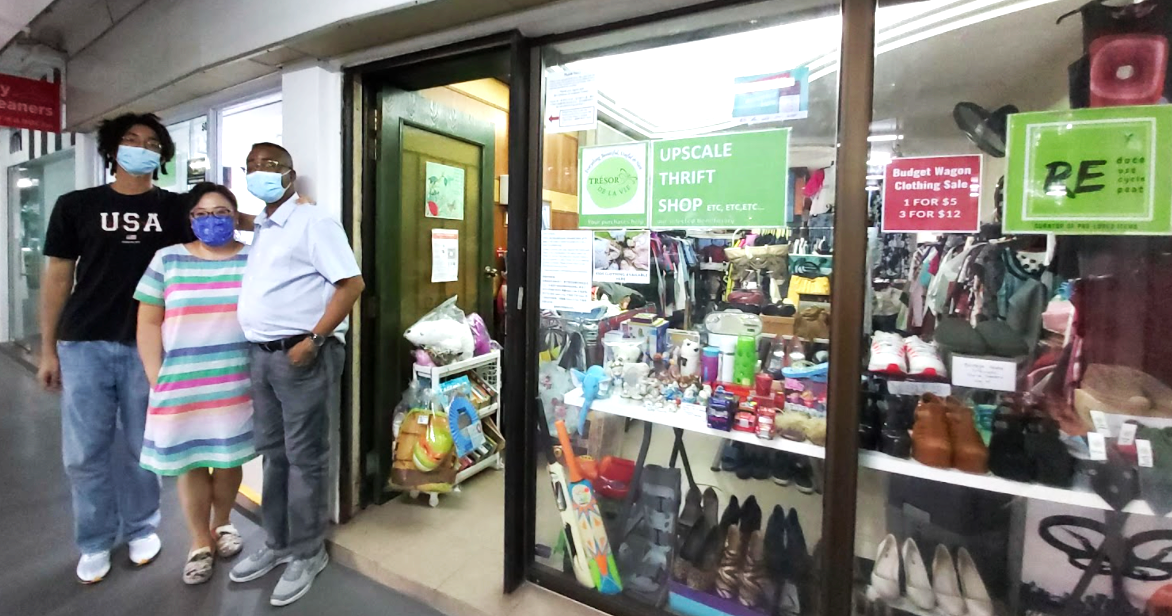While working as a missionary in Belgium in 1994, Jenny, a Chinese Singaporean, met her now-husband of 24 years, Emmanuel, a Togolese who was working there as well. The pair hit it off, eventually deciding to return to Jenny’s home country to tie the knot and start a family.
The couple settled down here, and started their dry-cleaning business Fabric à Sec in 2000, which has now been running for more than 20 years.
But in 2019, their business almost came to a halt due to Covid-19.
Business hard-hit by Covid-19
A sizeable portion of their clientele was made up of foreign expatriates living nearby, and many of these customers returned to their home countries during the pandemic, which caused business to dip.
There was also the fact that other shop owners, who had ended their leases in shopping malls, were seeking out more affordable rent in HDB estates, driving up demand — and rental rates — for such retail space.
By the end of 2020, their dry-cleaning business saw profits drop by more than 60 per cent. Initially, the government’s Rental Support Scheme helped alleviate their financial woes somewhat, but soon enough, the pair had to dip into their savings to keep the business afloat.
“Everybody was suffering; I wanted to do something to help myself and those around me.”
Facing pressure from their landlord to either rent the other half of the HDB shophouse or cease operations, the couple was faced with a dilemma.
On one hand, the pair wanted to keep Fabric à Sec running to continue serving their loyal customers.
But they also knew that it would be difficult to sustain a new business, given the already low customer footfall in the area.
Since the dry-cleaning business was already not making enough profit to cover their expenses, the couple decided not to expand the business into the neighbouring shophouse. Instead, they came up with the idea of a thrift store — selling second hand goods that were donated.
The pair agreed that running a thrift store seemed to be the most cost-effective venture and was confident in operating the business.
Besides branching out into a different business opportunity, the couple also intended for their new venture to also help the community by donating a part of their profits to charity.
“Across the board, everybody is suffering. [We asked ourselves] what is something we can do [if we] do not have inventories nor capital, and how can it help me and also help the people around us? So we thought, ok, let’s start a thrift store.”
And so in June 2021, Jenny and Emmanuel rented the other half of the HDB shophouse beside their dry-cleaning business and started their thrift store, Trésor De La Vie.
A thrift store with a cause
To obtain items for sale, they approached their long-time dry-cleaning customers to donate their used goods that were still in good condition.
As most of their customers were executives and working professionals, the items they received were often mid to high-end goods.
The pair thus decided to focus on selling mid to high-end products at significantly discounted prices as the highlight of their thrift store. Jenny and Emmanuel even enlisted their teenage son Manuel, an aspiring rapper, to model some clothes and shoes for their Carousell account.
Keeping the aim of helping the community in mind, the pair also wanted to make such goods more affordable and accessible for cash-strapped individuals.
Recounting an encounter with a young man who had finally found a job amidst the pandemic in 2021, the pair recalls how the man was pleasantly surprised to find pieces of Zara workwear that were priced at S$30 each, significantly cheaper than the original prices which range from S$60 to S$70.
The couple donates all their profits to charity, after covering expenses such as rent. The organisations include TOUCH Community Services and Red Cross Singapore.
“We want to do something meaningful. Even if it is not profitable, we want to at least be able to do something meaningful. We see this as our mission to the people around us that we will continue on [as long as it takes].”
Still in search of a profitable business model
Trésor De La Vie was set up with the intention of keeping their dry-cleaning business going.
However, eight months on, the couple is starting to see that the business may not be feasible given that the store has not been able to earn enough revenue to consistently cover rent.
Nevertheless, they still resolved to try different ways to get customers to support their small business.
The couple promoted their items online to attract more customers. On Instagram and Carousell, the couple put up “more sellable” items such as limited edition t-shirts, and shoes from brands like Dolce & Gabbana and New Balance.
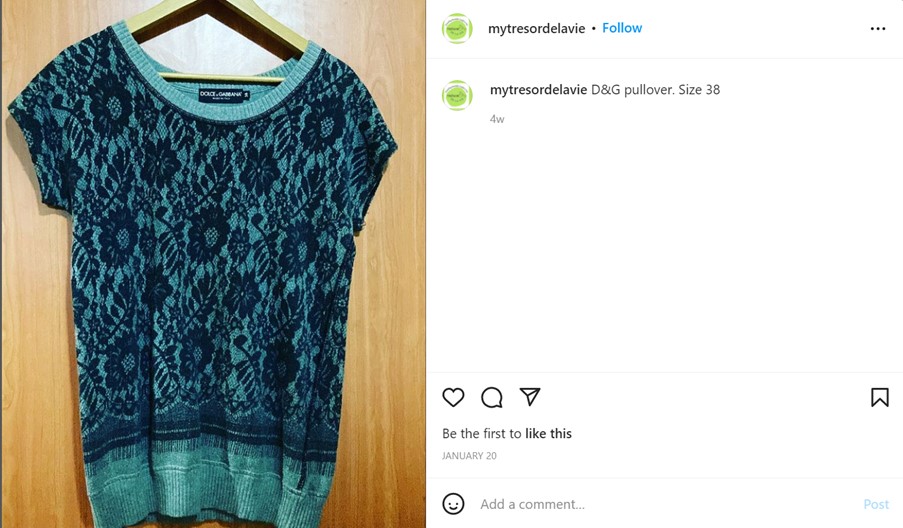 Image via Trésor De La Vie Instagram page.
Image via Trésor De La Vie Instagram page.
Reasonable prices
The couple hopes to keep prices of their goods reasonable, while considering the original price and quality of the items. The couple acknowledges:
“On one hand, because we sell mid- to high-end items we need [customers] who can afford these goods as ‘mid to high-end’ also means the goods will not be priced at S$20 or S$30.”
For example, the original price of a pair of Bottega sneakers sold at the store is S$1,300. Taking into account that the shoes were worn for less than half a year, the couple states that they “have to be very realistic” and cannot “price it at [just] S$50”.
The pair hopes that customers will understand that the cost of their items have to be estimated “in comparison with its [original] price and value”, and that this will not deter customers from patronising the store.
Wide range of goods available
Trésor De La Vie may look unremarkable from the outside. But the cosy atmosphere within the store can be felt in its clean interior and bright lights.
While the store may not be big, it is definitely well-stocked. From fast-fashion accessories priced at three items for S$12 to activewear brands like Lululemon, Trésor De La Vie is definitely the place to look for if you are looking for a good deal.
In one corner of the store, high-end bags from brands like Tod’s and Céline are displayed neatly on a shelf. A Freitag tote bag, originally priced at more than S$500, can be purchased at their store for just over S$200.
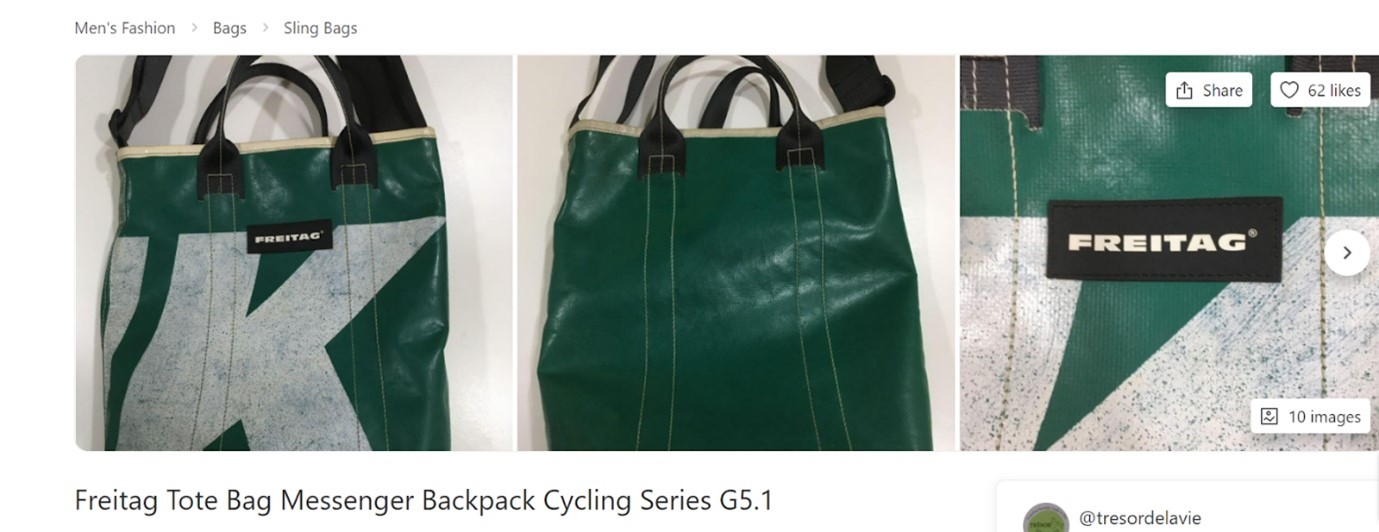 A used Freitag tote bag still in good condition. Image via Trésor De La Vie Carousell page.
A used Freitag tote bag still in good condition. Image via Trésor De La Vie Carousell page.
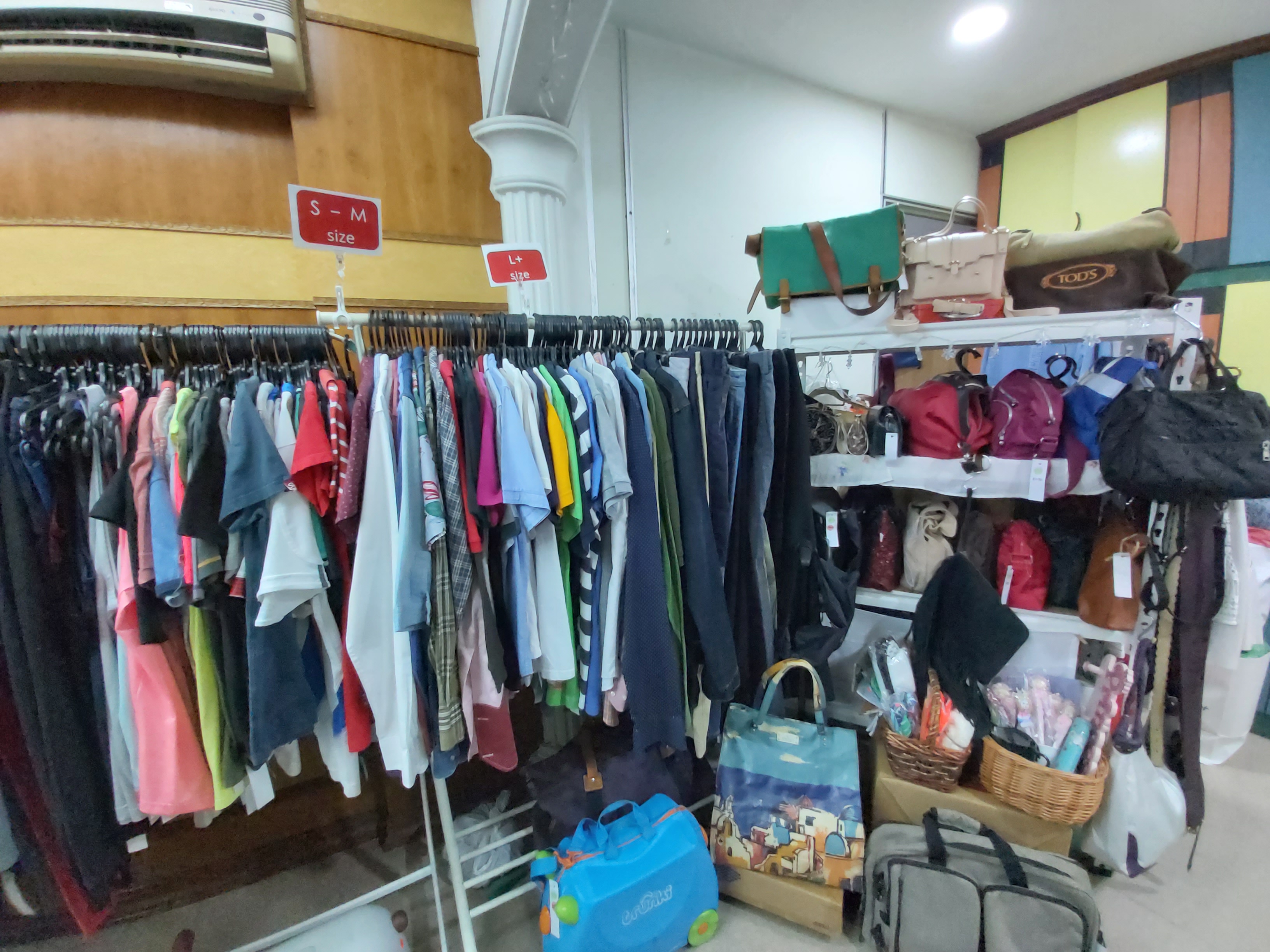 A wide range of apparels and high-end bags like Tod’s available for purchase. Image by Shynn Ong.
A wide range of apparels and high-end bags like Tod’s available for purchase. Image by Shynn Ong.
Various kinds of apparel and shoes can also be found, such as a set of Tsumori Chisato nightwear for S$85 (original price: S$135), a Dries Van Noten top for S$120 (original price: S$915), and even limited edition Adidas sneakers at S$125 (original price: S$275).
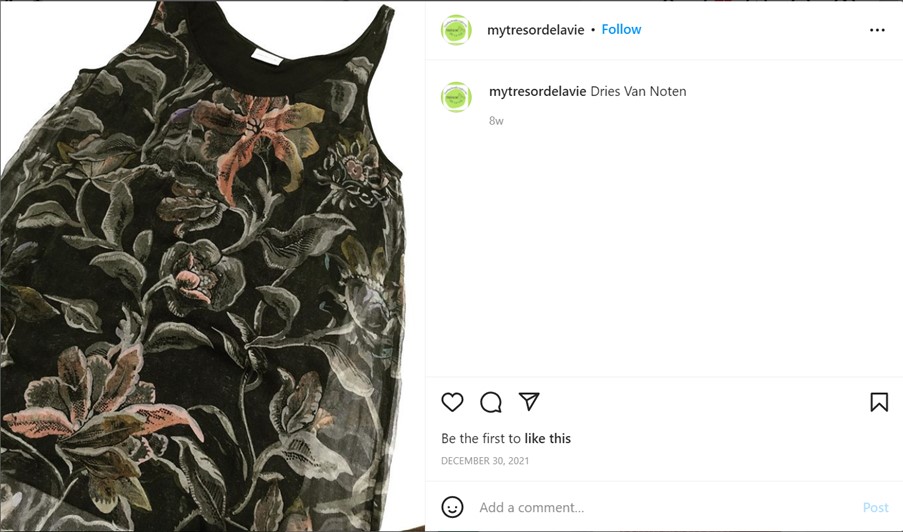 Dries Van Noten Ladies Top. Image via Trésor De La Vie Instagram.
Dries Van Noten Ladies Top. Image via Trésor De La Vie Instagram.
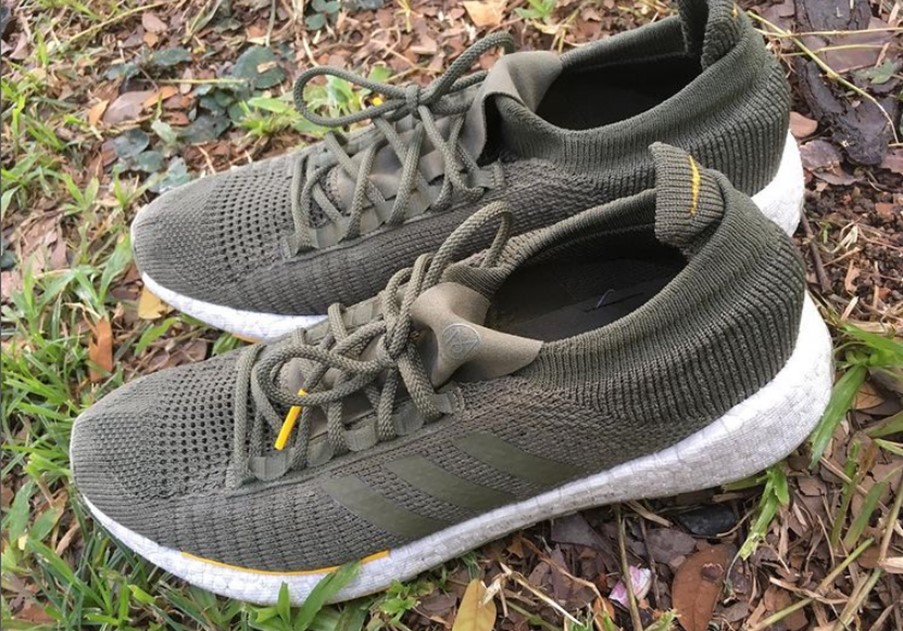 Limited edition Adidas x Monocle Pulseboost sneakers. Image via Trésor De La Vie Instagram.
Limited edition Adidas x Monocle Pulseboost sneakers. Image via Trésor De La Vie Instagram.
Challenges faced when seeking donations
In spite of the challenges they face, the couple is determined to keep their business running. The pair wants to educate the public on being socially responsible when donating their used goods, and to encourage a culture of recycling.
Having lived in the UK for some time, Jenny noticed the difference between the two countries when it came to recycling.
Some items they received had yellow stains, and were even torn or defective.
“Initially, we washed [all the goods] before we sold them because some of the clothes had very [heavy] yellow stains on them. But then we realised that it’s not viable, [as washing] these items also incurs a cost. If I’m the person shopping, I would also want to buy clean things [...]
So we want to teach people to give only items that are in good condition.”
Jenny lived thriftily while living in the UK, and often frequented charities such as Oxfam and shops selling second-hand goods.
She maintains that none of these charities or shops carried dirty or defective goods, and that even the second-hand furniture was of “good quality”. While acknowledging that the charities and shops could have curated good quality items for sale, Jenny believes that the social awareness of the people when donating their goods also had a part to play in the success of their recycling culture.
Jenny also observed that back in the 1990s, supermarkets in the UK already provided paper instead of plastic bags, to encourage recycling efforts. She also saw how many people also brought their own bags when shopping.
In comparison, Singapore is “hardly even [beginning]” in its efforts to do so today.
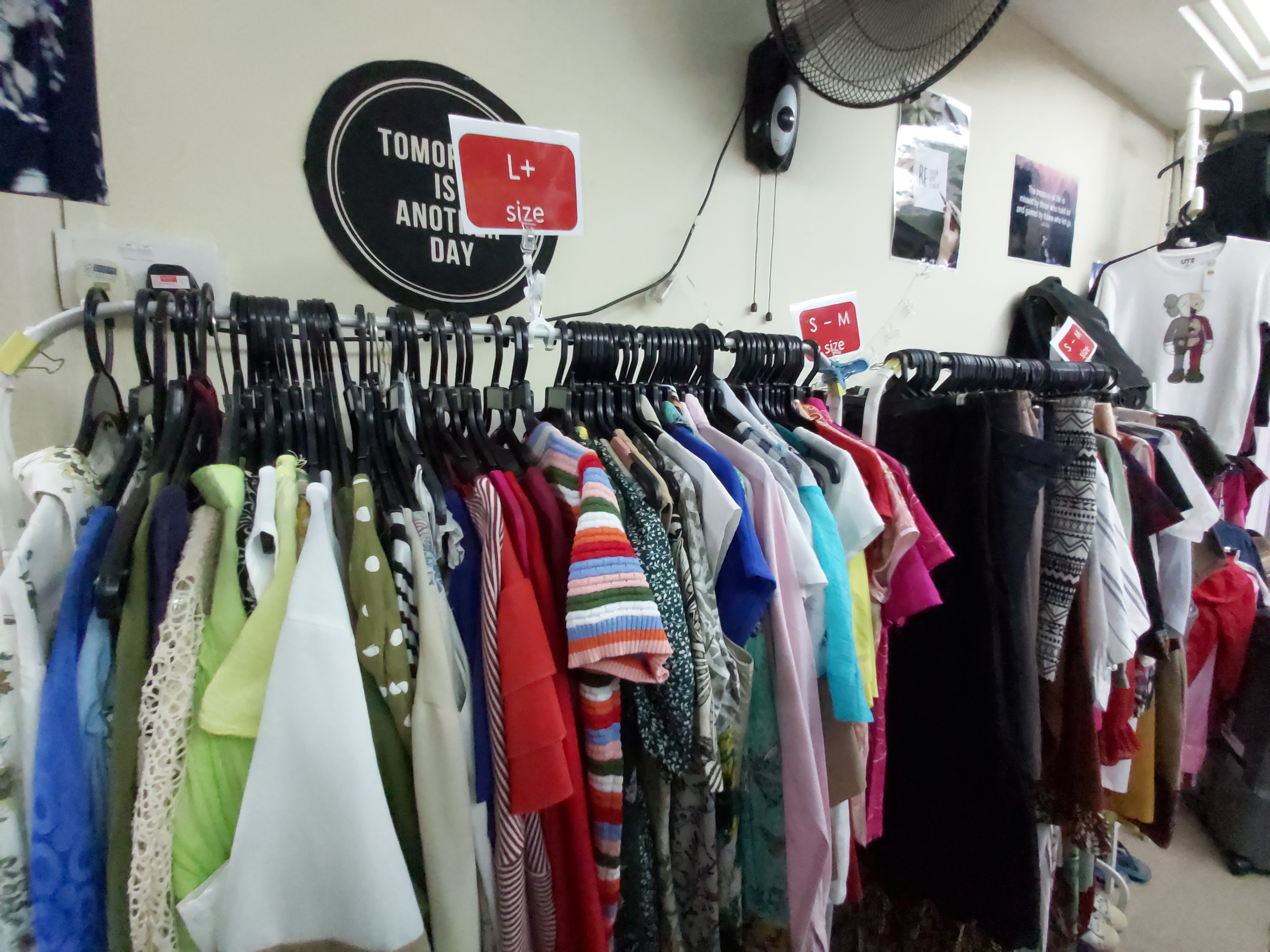 Apparels of varying sizes and occasions available for sale at Trésor De La Vie. Image by Shynn Ong.
Apparels of varying sizes and occasions available for sale at Trésor De La Vie. Image by Shynn Ong.
Difference in receptivity
Jenny acknowledges that the younger generation of Singaporeans is more aware of the need to recycle and are also open to buying second-hand goods. However, she believes that more can be done to convince the older generation of the benefits of thrifting.
“The older folks are not so keen [...] They might think that a dress [has been worn] before, or a pair of shoes might be smelly and cannot be worn. The older folks are more willing to [spend money] on branded stuff.”
Jenny believes that the high-end second-hand goods have a relatively longer lifespan as they are generally more durable. As such, she hopes that the older generation will be more receptive to buying more premium used goods and giving them a new lease of life instead of purchasing brand new branded goods.
Loyal customers kept them going
While the couple struggle to sustain their two businesses, it is the support of their loyal customers that has kept them going.
Jenny recounted a particular customer who insisted on dropping off his clothes at their store weekly — even if it was just a single piece of clothing — wanting to help the business in his own small way.
“They will come by every week [to engage our service] just like how they make a weekly trip to the supermarket. [We became] aware of [how] people are involved in our lives and affected by the business.”
“If we can hold up, we will continue”
The pair share that the future of their thrift store is uncertain, given the low footfall in recent months.
But the couple are holding out hope that business will pick up so they can further their aim of giving back to the community.
In the meantime, Jenny shares that they are still making it a point to donate to charity, even in months where the business does not break even.
“[We] set it up with the purpose to help the community. Even though the money [earned] is not enough to help us cover rent [...] We will continue to make an effort to give to the local charity every month, no matter how big or small.”
Ultimately, the couple states determinedly:
“We see it as a mission to the people around us [...] So if we can hold up, we will just continue [on]. We want to serve the community.”
Fabric à Sec and Trésor De La Vie are located at 77 Indus Road, #01-509, Singapore 160077.
If you like what you read, follow us on Facebook, Instagram, Twitter and Telegram to get the latest updates.
